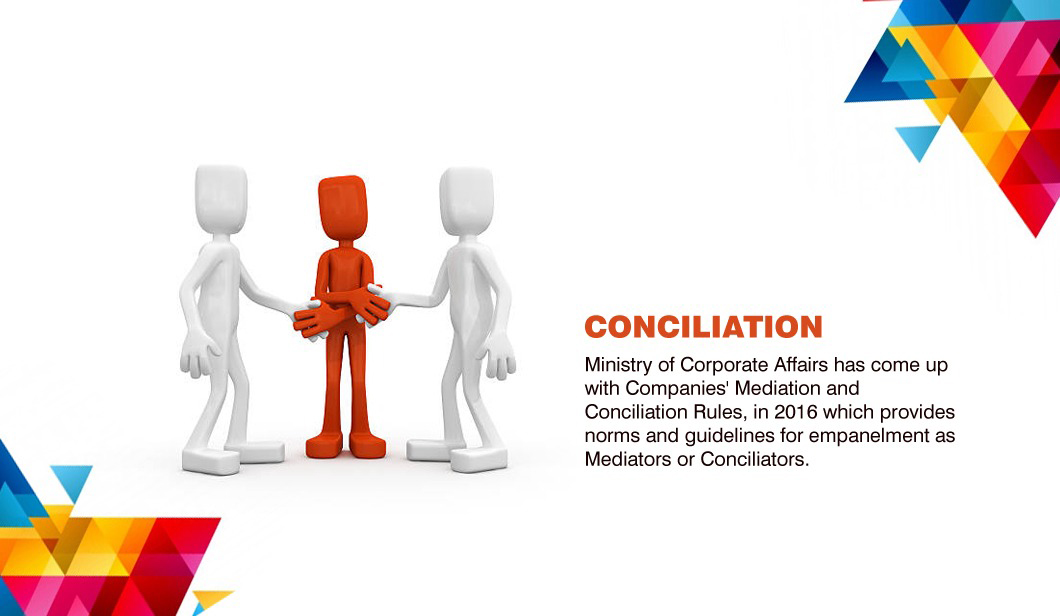Conciliation
Conciliation as dispute redressal mechanism is defined as a voluntary process in which a professional facilitator known as Conciliator, assists employers and employees to resolve disputes when their own unassisted efforts have not succeeded. The process can be described as a facilitated search towards an agreement between the conflicting parties.
Ministry of Corporate Affairs has come up with Companies' Mediation and Conciliation Rules, in 2016 which provides norms and guidelines for empanelment as Mediators or Conciliators.
Track Your Status
Conciliation Registration Package
Rs.15,000/-+18% GST
- What we provide
- Documents required
- Certificate of Incorporation (CIN)
- Permanent Account Number (PAN)
- Memorandum of Association (eMOA)
- Articles of Association (eAOA)
- Director’s Identification Number (DIN No)
- Digital Signature (DSC)
- GST Registration
- Company 2 Name
- Companies Object
- Address Proof (Rent Agreement, Receipt, Electrical Bill, Owner Property tax)
- Director's PAN, Aadhar, Voter Card
- Director's Electrical Bill
- Director's Driving Licence or Passport (If any)
- Director's Last 6 months Bank statement
- Director's Photo
- Director's Email and Mobile
How does it work?
The Workplace Relations Commission assigns a facilitator or conciliator, known as an Industrial Relations Officer (IRO), who acts as an independent, unbiased, fair chairperson in discussions and negotiations teams. The job of the IRO is to assist the parties in their efforts to reach a mutually acceptable and agreed settlement to their dispute.
What types of Dispute can be Referred to Conciliation?
Typical examples of the kinds of issue dealt with in the conciliation process comprises of claims for improvements in pay or conditions of employment, grading or ranking issues, disciplinary cases, disputes arising from proposed changes to the procedure of work done, company restructuring etc.
What Happens in Conciliation?
The process of Conciliation involves a sequence of meetings that usually take place on the same day, categorised as a conciliation conference. The process starts with the IRO presiding as a chairman a joint meeting of the parties, i.e. the employee(s) and the employer and/or their representatives. This is an interactive process involving two or more parties contending for different outcomes or solutions but seeking agreement by sharing information and adjusting their opinions or positions while, as far as possible, maintaining their interests.
Now, the joint meeting facilitates the IRO to hear the views and ideas of each party to the dispute and to clarify any issues of historical fact relating to the issue in dispute. The IRO usually then meets and talks separately with each party. The separate meeting with each party enables the IRO to explore the possibility for agreement on proposals to resolve the matter of dispute.
The IRO treats the whole conciliation process confidential that means all the information shared during the course of conciliation is secured and kept confidential.
Advantages of conciliation in dispute redressal
- Conciliation provides a more flexible alternative to arbitration as well as litigation, for settlement of disputes in the widest range of contractual relationships, as it is an entirely voluntary and mutual process.
- During the conciliation process, the parties have the liberty to withdraw from conciliation, without prejudice to their legal position, at any stage of the proceedings.
- The matter is settled at the brink of the dispute, avoiding protracted litigation efforts at the courts. As conciliation can be scheduled at an early stage of the dispute, an outcome can be reached much more quickly than in litigation.
- Parties are voluntarily engaged in negotiating a settlement.
- The conciliator, as a neutral and unbiased third party, can view the dispute objectively and can assist the parties in exploring alternatives which they might not have considered on their own, thus making the whole process of reaching a positive outcome easier.
- Confidentiality is maintained throughout the process on information shared, the offers and counter offers of solutions made and the resolution arrived at. Furthermore, information disclosed at a conciliation meeting may not be divulged as evidence in any arbitral, judicial or other proceeding.
The features of Conciliation such as Business Friendliness, Cost efficiency, Enforceability, Promptness and Paperless process makes it more feasible and convenient option for dispute settlement. Thus it can be understood why Conciliation is considered to be better than other alternative modes of dispute resolution.
Need Consultancy? Ask Tax Seva Kendra Expert@ Rs. FREE
- Free Consultancy
- Online Documentation
- Anywhere In India





